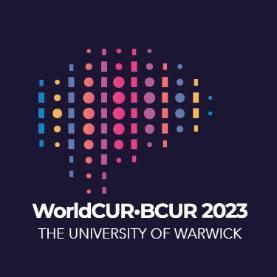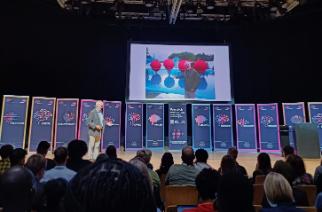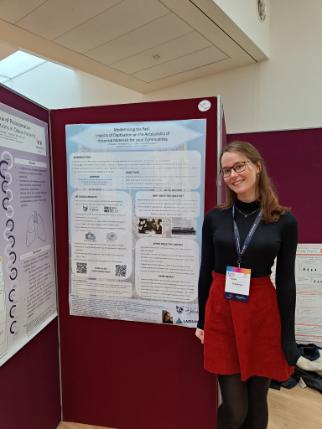WorldCUR-BCUR 2023
Posted on 18 April 2023

Emily Bowen, BA History 2021-24
From 3-6 April 2023, undergraduates from across the globe gathered at the University of Warwick to participate in the annual World Conference for Undergraduate Research (WorldCUR), paired for the first time with the British Conference of Undergraduate Research (BCUR), running between the 5th-6th April. Members of both conferences spent the time allotted exploring the themes of Power, Health, Sustainability, Community, Data, Create, and The Future, through research conducted and presented by their peers.
Having completed my research on the impacts of digitising historical materials for the local community of York last summer, I applied to present my poster at the BCUR, after receiving an email from my department rep, Amelia (Meely) Doherty, who had applied to present her own research at the WorldCUR. As I had never presented my research before, I wanted to build up to delivering spoken presentations to larger audiences, and so I felt that a poster presentation within the smaller conference would be more appropriate at this stage in my academic career.
.jpg)
Meeting Meely and other WorldCUR delegates
I travelled to Warwick the evening before the BCUR opened, and began networking at the student union bar with Meely and the people she had met so far at the WorldCUR. This initial networking set me up well for the rest of the conference, as although they were all attending the WorldCUR, we bumped into each other throughout the day on campus and it was always nice to see a friendly face. One member of the group had also seen my poster during the WorldCUR session, and had even taken a photo of it! This really started the conference off on a good note for me, as I felt more confident in the fact people would be interested in my research and want to talk about it further.
The BCUR began the following day with registration and an opening keynote from Professor Sir David Spiegelhalter, on how to communicate research to different audiences. From a presenter perspective, this informed everyone nicely before embarking on their own research presentations, and it was frequently referred to in the following days! But also from a public history perspective, the points made regarding simplifying information without losing the important messages were fascinating, and felt relevant to the goals of public history to increase outreach and engagement with the past.

Professor, Sir David Spiegelhalter discussing his communication of statistics when competing on Total Wipeout
The rest of the day was spent attending spoken presentations, with my favourite entitled ‘Pace University COVID-19 and Black Lives Matter Movement Oral History Project’ by Madison Turunen. It was great to hear from another public history researcher, and the discussion we had afterwards about the overlaps of our projects was so interesting! She mentioned that the project is in the process of digitising and transcribing all of the interviews, and hope to record more to assess the long term impacts of the pandemic and BLM movement.
I also had my poster presentation session, in which I stood by my poster and prepared to talk to maybe two or three people about my research – how I underestimated myself! During the one hour session there was barely five minutes I had without someone reading or engaging with me about my research. Of particular note were the Professors from the University of Central Oklahoma and Pace University, who had seen my poster in the previous session (during the WorldCUR) and wanted to discuss further with me! The questions I got asked caused me to think deeper about my research, and presented new areas that could potentially be explored off the back of it. It was also lovely to bump into other Laidlaw Scholars, presenting their own research from the same scholarship.

Emily presenting her research poster
We then had a quick turn around and prepared for the gala dinner, which both WorldCUR and BCUR delegates could attend. The dinner was amazing and offered a chance to meet an even wider range of undergraduates from all around the world. Even once the dinner had ended, delegates continued talking and sharing their research interests in locations around the Warwick campus.
The next day was the final day of the conference for all delegates. Full of even more spoken presentations on a variety of topics, there was also another opportunity to view the research posters and, whilst I was not presenting mine, I got to explore and learn from a variety of disciplines which was incredible. I also caught a couple people reading through my own poster again.
After closing remarks and a discussion panel on undergraduate research, led by David Metcalfe, it was time to depart from Warwick, although not without exchanging LinkedIn and social media handles to remain in contact and up to date with what everyone goes on to achieve next! I am so grateful to have had this opportunity, and it has inspired me to apply to more conferences to present my research on the impacts of digitising history. I hope I increased awareness and interest in the importance of my topic, and encouraged people to explore their own local histories.
Thanks must be extended to the organisers of the conference, the University of Warwick for hosting, Dr Catherine-Rose Hailstone for her ongoing support, and to Amelia Doherty, without whom I wouldn’t have thought to apply.
